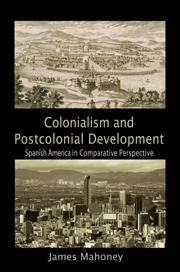Book contents
- Frontmatter
- Contents
- List of Tables, Figures, and Maps
- Preface
- 1 Explaining Levels of Colonialism and Postcolonial Development
- 2 Spain and Its Colonial Empire in the Americas
- 3 Mercantilist Colonialism
- 4 Liberal Colonialism
- 5 Warfare and Postcolonial Development
- 6 Postcolonial Levels of Development
- 7 British and Portuguese Colonialism
- 8 Conclusion
- Notes
- Glossary
- Select Bibliography of Works on Colonial Spanish America
- Index
- Titles in the Series
7 - British and Portuguese Colonialism
Published online by Cambridge University Press: 05 June 2012
- Frontmatter
- Contents
- List of Tables, Figures, and Maps
- Preface
- 1 Explaining Levels of Colonialism and Postcolonial Development
- 2 Spain and Its Colonial Empire in the Americas
- 3 Mercantilist Colonialism
- 4 Liberal Colonialism
- 5 Warfare and Postcolonial Development
- 6 Postcolonial Levels of Development
- 7 British and Portuguese Colonialism
- 8 Conclusion
- Notes
- Glossary
- Select Bibliography of Works on Colonial Spanish America
- Index
- Titles in the Series
Summary
The policy of Great Britain with regard to the trade of her colonies has been dictated by the same mercantile spirit as that of other nations, it has, however, upon the whole, been less illiberal…than that of any of them…The absolutist governments of Spain, Portugal, and France, on the contrary, take place in their colonies…The administration of the French colonies, however, has always been conducted with more gentleness and moderation than that of the Spanish and Portuguese.
– Adam SmithSpain was but one of several European powers that embarked on overseas colonization projects. Belgium, Britain, France, Germany, Italy, the Netherlands, and Portugal all controlled their own colonies in Africa, Asia, or the Americas. No one denies that different colonizing nations left distinctive legacies in their subject territories, such as their own European language. But recently, influential work on colonialism tells us that which European power colonized a particular territory did not matter in other critical ways. Any institutional differences among the European nations did not, according to these arguments, affect the political-economic institutions that were established in the colonies. Nor did differences across the European powers have any discernable impact on long-run development outcomes. Instead, variations in development outcomes are explained solely on the basis of differences in the precolonial territories themselves.
Yet such arguments about the irrelevance of colonizer identity cannot be sustained. In the keynote passage for this chapter, Adam Smith provides one set of reasons why.
- Type
- Chapter
- Information
- Colonialism and Postcolonial DevelopmentSpanish America in Comparative Perspective, pp. 229 - 252Publisher: Cambridge University PressPrint publication year: 2010



